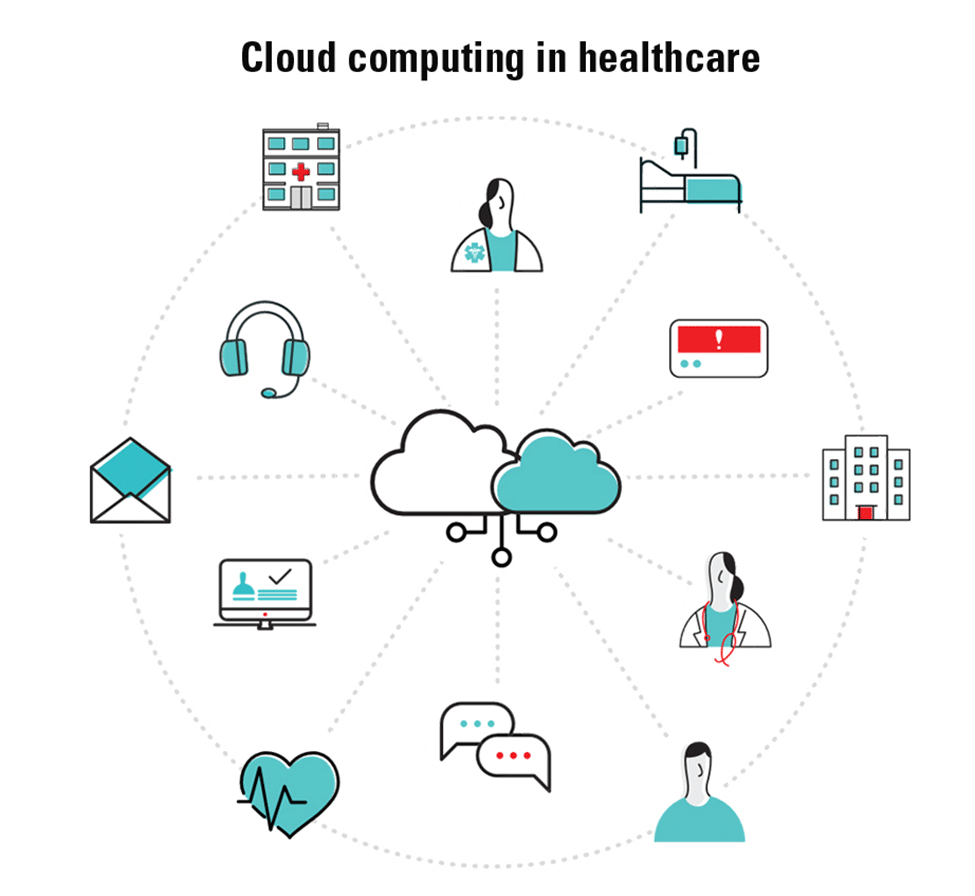Implementation of Cloud computing within the healthcare industry
The usage of cloud computing in healthcare has skyrocketed. Throughout the epidemic, the whole healthcare system relied on the use of cloud computing. Every medical institution, in addition to physicians and nurses, has reaped the benefits of IT infrastructures.
Improved privacy, cheaper costs, and better patient care through remote operation and cooperation are some of the benefits of greater usage of cloud technologies in healthcare. The use of cloud computing in healthcare provided new opportunities to improve the operation of IT systems.
Meaning of healthcare technology
Healthcare technology, often known as health information technology, refers to any instrument or program aimed to increase the productivity and efficiency of health systems, provide patient insights to enhance treatments, and improve the overall quality of healthcare.

Relevancy of technology within the healthcare industry
Technology has a significant influence on every part of our lives since it connects our homes, workplaces, and everything else we do. With the development of technology, the globe is getting smaller.
Out of all the industries where technology has had an impact, healthcare is the one that has had the most significant impact. As a result, it is not surprising that the healthcare sector is becoming more and more dependent on technology. Health-care systems are experimenting with new approaches to enhance service, provide more customized treatment with more exact diagnosis and medicine, and improve patient health.
Read more: Ways to Avoid Security Issues in App Development
Technological innovations provide patients, caregivers, and healthcare systems with access to high-quality care, treatments, and pharmaceuticals, improving and saving countless lives throughout the world.
Meaning of cloud computing
It can be defined as a “no-brainer.” It is an on-demand computing solution that makes “n” number of cloud-based data centers available to a large number of customers at the same time. Central servers share this data across several locations. This technology enables data access from anywhere in the world.

Previously, accessing information required being on a computer or server. And had to keep a plethora of information-filled folders on the desktop. On the other hand, people may access their data through the internet using cloud-based applications. Dropbox, Facebook, and Gmail are examples of popular cloud computing services. These cloud storage services have enabled consumers all around the world with unlimited storage of data, photographs, and movies.
Cloud and healthcare
Cloud computing is a technology that benefits both patients and health care institutions. It in healthcare make it easier to employ technology like mobile apps, patient portals, electronic medical records, IoT, and so on. Health systems can benefit from cloud computing in terms of both business and patient satisfaction. Through cooperation and interoperability, healthcare organizations may decrease costs, increase privacy, and improve patient care by embracing cloud technologies.
How the healthcare industry uses cloud computing
Cloud computing and healthcare have several applications. There are several applications for cloud computing in the healthcare business, and they can aid in data management and storage. Additionally, data may be easily accessible from anywhere, and with the necessary permissions, many tasks can be completed. So, if your business or companies rely on pricey data centers, cloud computing in the healthcare industry can alleviate your concerns.
Following the worldwide epidemic, there is a greater demand for improved and more competent systems and procedures. Furthermore, EMR records may be handled via healthcare cloud computing and securely kept utilizing cutting-edge techniques and approaches. When compared to traditional data storage and administration methods, this will be simpler and less expensive. One of the numerous benefits of cloud computing is that it can be highly beneficial in the future. The application of artificial intelligence and machine learning is an alternative that can aid in the sorting, structuring, and usage of data for various modeling objectives.
Advantages of cloud computing in the healthcare industry

Better medical collaboration
Healthcare cloud computing allows us to execute procedures that would otherwise be impossible. All of this is made possible with 24-hour availability, simple storage, and quick speeds. Constant communication and information exchange would allow healthcare institutions to better serve their patients. Furthermore, patient history management via electronic records would enable hospitals and other institutions to communicate all of this information with the appropriate individuals.
Cost-effective
Data storage is already rather convenient these days, and with the inclusion of the cloud, the process becomes smooth. With healthcare cloud computing, you’ll not only receive a streamlined method of storing essential data, but also a cost-effective one. Reduced data storage costs for healthcare records enable better decision-making and aid in other areas of investment.
Read more: How to convert an iOS app into Android or vice-versa?
EMR could be managed effectively
EMR has been around for a long time. It assists healthcare practitioners in handling patient records as well as all other relevant records. Cloud computing makes it simpler to manage the EMR and improve the calibre of medical services. The usage of cloud computing provides enhanced services for everybody, from data safety and security to process efficiency. Once implemented, doctors, management professionals, and nursing staff may readily update the cloud systems.
Enhanced research and analysis
Many different forms of data may be collected, stored, and retrieved using cloud computing. Later, by analysing the data, several different types of information may be derived. Possibilities for cloud computing in healthcare might hasten research efforts. There could, however, be some challenges. In the healthcare sector, cloud computing is being employed more and more often. However, only a very little amount of study is being done. Businesses will need to push themselves to do more in this area.
Optimal security
Having the high-security feature of the cloud on your side is critical, as increased cyber risks are becoming the talk of the town. However, cloud technology allows you to strengthen data security standards and reduce cyber security concerns. Furthermore, the availability of contemporary technology and its efficient application might enable a healthcare company to safeguard patient records.
Read more: Software testing best practices: Knowing the distinguished specifications
Scalability
The architecture of cloud computing in healthcare makes it simple to scale whatever you want to build. System, process, and procedure tweaks and upgrades can be made to implement fresh concepts and grow beyond available resources. Businesses have complete control over data storage, access, management, and everything else thanks to cloud-based solutions. This suggests that these systems’ capacity may be controlled and increased as necessary.
Risks associated with cloud computing within the healthcare industry
Although cloud computing offers several advantages to healthcare still there are some issues associated with the same.
Restricted ecosystem
The use of cloud technology in healthcare alone cannot make the entire sector productive and efficient. Healthcare firms must employ Artificial Intelligence, the Internet of Things, and Data Management technologies to reap the benefits of modern technology.
Lack of experts
It is difficult to locate experienced developers in the healthcare software space that are capable of incorporating new technology into the business. Similarly, cloud professionals in the health industry are hard to come by.
Security issues
The fundamental reason for using cloud technology is to store healthcare data. However, it is not without security dangers. Because of the basic cloud configuration, a company’s data shared on the server with other firms and distant systems to individualize them may fail. As a result, healthcare organizations are unable to implement cloud technologies.
Issues in adapting technologies
The transition from the old framework to cloud technology must overhaul the entire task management process. Healthcare organizations must train everyone on how to use it in their regular work.
Ways to avoid risks while implementing cloud computing within healthcare?
The use of healthcare cloud computing is a multi-step process that necessitates collaboration between a healthcare institution and a technology vendor. Furthermore, it would be beneficial to consider certain precautions to prevent the hazards linked with cloud technology.
Read more: HIPAA & Other Necessities for Healthcare App
Decide the objectives-
First, understand the need for cloud systems in your healthcare organization. Otherwise, you won’t be able to specify the items that require scalable cloud solutions. Some motivations for using cloud technology include:
• Cost-cutting measures
• Security enhancements
• Complaint management
• Improved data security and backups
Knowing the major objectives allows you to interact more effectively with your technology supplier. They may also give customized cloud computing solutions based on your company’s needs.
Make a list of functions to switch to the cloud
You may have numerous procedures to migrate to the cloud, but you must recognize that some specific functions require this enhancement. As a result, examine your healthcare organization’s present pipeline and identify the impediments to excellent medical service or the functioning of your healthcare team. After evaluating your company’s procedures, prioritize the rapid transition to the cloud to gain the most benefits. Furthermore, it will aid in improved communication with the technology provider and the precise time required for technical delivery.
Calculate the investment needed
Migrating to the cloud necessitates a particular expenditure. As a result, determine if your company can afford such investments. Paying IT specialists involved in the entire transfer procedure is the biggest expense.
Types of cloud computing in healthcare
The various forms of cloud computing in the healthcare sector may be categorised using the following two models:
| Distribution model | Deployment model |
| SaaS– (Software as a Service) here the software is licensed on a subscription basis and is hosted certainly. | Community– a group having similar preferences can have access to this technology. |
| IaaS-(Infrastructure as a Service) provides individuals and businesses with the resources on their demand with the help of the cloud. | Hybrid– different access options are integrated with multiple clouds. |
| PaaS-(Platform as a Service) provides a cost-effective, flexible, and complete platform for developing and running software. | Private– only a specific person can access this technology. |
| Public– this technology can be used by the common people. |
The long-term impact of cloud computing within the healthcare sector
Cloud computing has shown to be beneficial in a variety of ways in the healthcare sector. The cloud can do everything, from enhancing system efficiency to delivering quality. It has the potential to improve the healthcare system in the long run. Cloud computing in healthcare has become an urgent requirement for the entire world. Implementing cloud computing in the healthcare industry can meet the changing needs of the current world. End-to-end implementation has the potential to swiftly modify and enhance service and management standards.
Sum-up
In the healthcare business, technical advancements and innovations are ongoing. Cloud computing is one such technology that is robust, efficient, and secure. It has evolved into an essential element of healthcare technology. To summarize, cloud technology has enormous potential to favorably affect the health care business by enabling faster, more secure, and better patient care.
The application of cloud computing in healthcare is altering the business and has a long way to go in the healthcare sector. It provides several advantages, ranging from cost savings to data storage and cooperation enhancement.
Amplework Software has over a decade of expertise and a team of skilled professionals who provide cloud computing services. Hire us as your healthcare app development business and reap the benefits of new technology!



 sales@amplework.com
sales@amplework.com
 (+91) 9636-962-228
(+91) 9636-962-228





